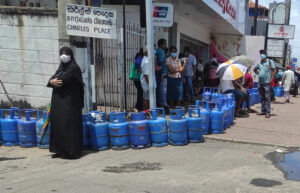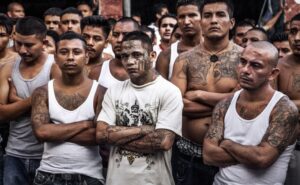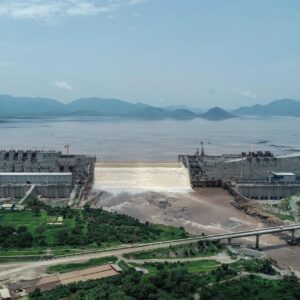After my groups personal research on Sri Lanka and listening to a few podcasts on countries: El Salvador, Egypt, and Singapore I have determined some similarities in the hindering of SDG goals. To begin, in researching Sri Lanka there was a large portion of information on the states economic default and poor governance. The state suffered from a corrupt system of leadership which contributed to dangerous implications of the economic default. Citizens experienced food and gas shortages and were living in a poverty.

Sri Lankan Citizens waiting in line for gas
Our research also highlighted gender discrepancies in the workplace; specifically the lack of women in the workplace and the discrimination towards them. These are a few examples of the countries regress towards SDG Goal 5- Gender Equality and 8-Decent Work and Economic Growth. The states poor governance ties into SDG Goal 16- Peace, Justice, and Strong Institutions.
A potential contributor to these regressions is a lack of support from outside sources economically and politically. Like the case for most developing countries, improving relations with dominant world powers has been on the agenda since the end of the Cold War. But, because these relationships are not fully established, one can argue that this presents less opportunity to recover from hardships, and in this case, the hindering of SDG progress. This was the case for Sri Lanka and its economic default, as the state is still in a very slow recovery. The country did receive assistance from countries like the U.S and India but unemployment, poverty, and like previously mentioned; gender disparities still largely infect the population.
El Salvador has had similar experiences with poor governance as this country has been overrun with gang activity for many decades. At some points in time the gangs were so rampant they were essentially more powerful than the government.

El Salvador gang
Furthermore, the inhabitants of El Salvador lack educational resources (SDG 4- Quality Education) which contributes to more gang members, as it’s the only option to feel secure. There have been solutions implemented by El Salvador’s current president, Nayib Bukele, to address gang activity. But one solution (proposed as an act) ended up wrongfully incarcerating thousands of the countries inhabitants. Furthermore, Salvadorians have lost their freedom of speech as this act placed strict laws on journalism and forms of addressing news.
It is assumable that developing countries face more discrepancies, injustices, and lack of human rights compared to developed countries. They not only lack assistance from outside sources, but the countries themselves struggle with governance. This could be due to the rapid, continued growth of developed nations as it is extremely difficult to keep up in todays age. To support this claim, Egypts issue of water stability is a prime example of struggling to keep up while also highlighting the regress towards SDG 6- Clean Water and Sanitation. Egypt heavily relies on the Nile River as its main source of water. If we look at dominating countries like the U.S and China, their sourcing of water is much different. The United States water sources are an abundant amount of rivers, lakes, and groundwater, and vary by state. Egypt is much different as the entire country relies on a single source for the majority of its water. China, similarly to the U.S, also sources its water from lakes and rivers. Although this could just be a geographical problem as Egypt is majority dessert and lacks other water outlets, there is a reason why Egypt has struggled and is continuing to struggle with their access to water. This reason could be a lack of resources, no help from the outside, or the building of dams and fights of who is in charge of the Nile.

Nile River dam. The construction of this dam has caused conflict with Ethiopia.
To conclude, the evidence that has been presented to me has highlighted mostly regresses towards Sustainable Development Goals. I believe this regression is due to the lack of aid from developed countries and the poor governance that developing countries entail because they cannot keep up. The international system is a consistent power struggle and the most developed countries sometimes fail to rightfully support their neighbors. Dominant world powers need to address and make developing countries struggles known because theses states cannot adequately rebuild their mishaps on their own.
Mahra Almesaybeh
November 15, 2023 — 1:10 pm
Hi Alanna! First of all, thank you for taking the time to listen to our El Salvador podcast, I appreciated reading how much you took away from it. It’s clear how almost all SDGs tend to tie into each other, the most important of all being SDG 16: Peace, Justice and Strong Institutions. Establishing strong institutions is integral for a country to prosper, as you mentioned with Sri Lanka, poor governance lead to resource inequalities and gender disparities. Sri Lanka’s issue with bad governance reminded me of Brazil’s case (another great podcast to listen to!) where, despite being a resource-rich country, the people rarely get to taste its revenue because of insitutional corruption. Thank you for this thoughtful review, and well done for completing the TSP project with a bang!
chastaic
November 15, 2023 — 8:51 pm
Thanks for listening to our Egypt podcast!
I definitely agree that international factors are largely harmful to countries’ ability to make SDG progress. I think your arguments here make sense but I think they would benefit from considering the goals of the international factors that the countries in question are interacting with. When powerful states like the U.S. interfere in the affairs of another country they don’t tend to do so with the interests of that country as their top priority. Instead, they tend to be acting in their own interest. International factors generally are created to serve the interests of their creators. I believe that this factor is a key reason why international factors mostly detract from countries’ ability to make progress on SDGs
Hind Alansari
November 16, 2023 — 1:00 pm
Thank you for sharing your perspective on our last blog post! I agree that Global South countries face many challenges to achieve the United Nations Sustainable Development Goals. In your assigned case, Sri Lanka, poverty is evident throughout the country. You also argued abuse and discrimination towards women, which made me wonder if there were any labor exploitation cases in Sri Lanka that you came across? Also, on the topic of international factors, since you discussed SDG 8, were you aware of the OPEC Fund for International Development (OFID), which played a role in rebuilding Sri Lanka.
Sarvagya Sharma
November 17, 2023 — 11:23 am
Thank you, Alaana, for providing your thoughtful insights about the domestic and international factors affecting the development of various SDGs in El Salvador, Sri Lanka, and Egypt. It was quite interesting to read about SDG 9 concerning Egypt and other developed countries such as China and the United States. In a slight contrast, I talked about Sri Lanka and Indonesia in my blog, where I emphasized more on the international factors affecting those countries, especially Sri Lanka. In addition to what you mentioned about Sri Lanka, apart from the poor domestic governance, the country’s condition has also deteriorated to a certain extent as it has been subjected to a playground for dominant regional and international powers such as China. Since you mentioned the need to make the developing countries’ struggles known and addressed, don’t you think the chances of this happening will only be possible if the dominant actors have a vested interest in those countries, keeping realism in mind?
evelynmw
November 18, 2023 — 1:42 am
Hi Alanna, thank you for your post! I found your take on Sri Lanka, Egypt, and El Salvador very interesting. While I did not listen to the same podcasts as you, I think your conclusion that the SDGs have been hindered by a lack of economic support and ineffective governments is quite valid. I know that in my group’s country, Indonesia, there was available financial aid, but it was unable to be used effectively because of geographic and political factors. I think this is an unfortunate reality in many Global South countries, and that developed countries should do more, collaboratively, to ensure that their financial aid is being given in ways that will result in real, positive effects. Do you think it would be better for funding to be given to the governments of these Global South countries or to local organizations there?